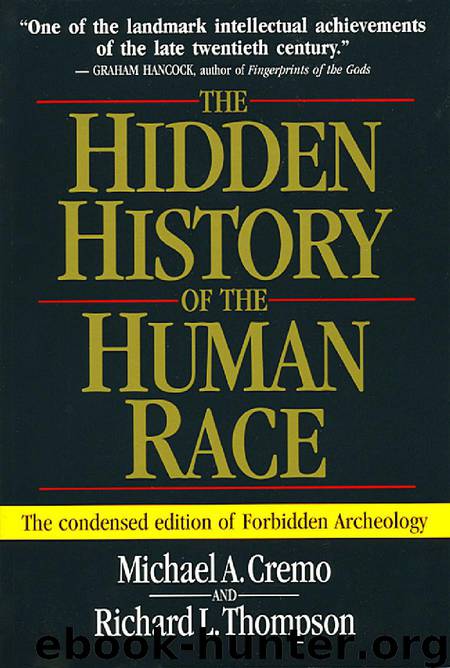The Hidden History of the Human Race by Michael A. Cremo

Author:Michael A. Cremo
Language: eng
Format: mobi
Tags: Body, Life Sciences, Prehistoric, Social Science, Eastern, Human Remains (Archaeology), Science, Philosophy, Evolution, General, Anthropology, Human Evolution, Mind & Spirit, Human Beings, Fiction, Archaeology
ISBN: 9780892133253
Publisher: Torchlight Publishing
Published: 1995-01-02T06:00:00+00:00
Part II
ACCEPTED EVIDENCE
8
JAVA MAN
At the end of the nineteenth century, a consensus was building within an influential portion of the scientific community that human beings of the modern type had existed as far back as the Pliocene and Miocene periods—and perhaps even earlier.
Anthropologist Frank Spencer stated in 1984: "From accumulating skeletal evidence it appeared as if the modern human skeleton extended far back in time, an apparent fact which led many workers to either abandon or modify their views on human evolution. One such apostate was Alfred Russell Wallace (1823-1913)." Wallace shares with Darwin the credit for having discovered evolution by natural selection.
Darwin thought Wallace was committing heresy of the worst sort. But Spencer noted that Wallace's challenge to evolutionary doctrine "lost some of its potency as well as a few of its supporters when news began circulating of the discovery of a remarkable hominid fossil in Java." Considering the striking way in which the Java man fossils were employed in discrediting and suppressing evidence for the great antiquity of the modern human form, we shall now review their history.
EUGENE DUBOIS AND PITHECANTHROPUS
Past the Javanese village of Trinil, a road ends on a high bank overlooking the Solo River. Here one encounters a small stone monument, marked with an arrow pointing toward a sand pit on the opposite bank. The monument also carries a cryptic German inscription, "P.e. 175 m ÖNÖ 1891/93," indicating that Pithecanthropus erectus was found 175 meters east northeast from this spot, during the years 1891-1893.
The discoverer of Pithecanthropus erectus was Eugene Dubois, born in Eijsden, Holland, in 1858, the year before Darwin published The Origin of the Species. Although the son of devout Dutch Catholics, he was fascinated by the idea of evolution, especially as it applied to the question of human origins.
After studying medicine and natural history at the University of Amsterdam, Dubois became a lecturer in anatomy at the Royal Normal School in 1886. But his real love remained evolution. Dubois knew that Darwin's opponents were constantly pointing out the almost complete lack of fossil evidence for human evolution. He carefully studied the principal evidence then available—the bones of Neanderthal specimens. These were regarded by most authorities (among them Thomas Huxley) as too close to the modern human type to be truly intermediate between fossil apes and modern humans. The German scientist Ernst Haeckel had, however, predicted that the bones of a real missing link would eventually be found. Haeckel even commissioned a painting of the creature, whom he called Pithecanthropus (in Greek, pitheko means ape, and anthropus means man).
Influenced by Haeckel's vision of Pithecanthropus, Dubois resolved to someday find the ape-man's bones.
Mindful of Darwin's suggestion that humanity's forbearers lived in "some warm, forest-clad land," Dubois became convinced Pithecanthropus would be found in Africa or the East Indies. Because he could more easily reach the East Indies, then under Dutch rule, he decided to journey there and begin his quest. He applied first to private philanthropists and the government, requesting financing for a scientific expedition, but was turned down.
Download
This site does not store any files on its server. We only index and link to content provided by other sites. Please contact the content providers to delete copyright contents if any and email us, we'll remove relevant links or contents immediately.
Sapiens: A Brief History of Humankind by Yuval Noah Harari(14368)
Sapiens by Yuval Noah Harari(5365)
Pale Blue Dot by Carl Sagan(4996)
Homo Deus: A Brief History of Tomorrow by Yuval Noah Harari(4907)
Livewired by David Eagleman(3764)
Origin Story: A Big History of Everything by David Christian(3687)
Brief Answers to the Big Questions by Stephen Hawking(3429)
Inferior by Angela Saini(3311)
Origin Story by David Christian(3194)
Signature in the Cell: DNA and the Evidence for Intelligent Design by Stephen C. Meyer(3127)
The Gene: An Intimate History by Siddhartha Mukherjee(3094)
The Evolution of Beauty by Richard O. Prum(2993)
Aliens by Jim Al-Khalili(2827)
How The Mind Works by Steven Pinker(2813)
A Short History of Nearly Everything by Bryson Bill(2689)
Sex at Dawn: The Prehistoric Origins of Modern Sexuality by Ryan Christopher(2513)
From Bacteria to Bach and Back by Daniel C. Dennett(2481)
Endless Forms Most Beautiful by Sean B. Carroll(2473)
Who We Are and How We Got Here by David Reich(2431)
